Trollfjord
The Trollfjord or Trollfjorden is a fjord in Hadsel Municipality in Nordland county, Norway. The 2-kilometre (1.2 mi) long fjord cuts into the island of Austvågøya and flows out into the Raftsundet strait. The fjord has a narrow entrance and steep-sided mountains surrounding it. The name is derived from troll, a figure from Norse mythology.
| Trollfjord | |
|---|---|
| Trollfjorden | |
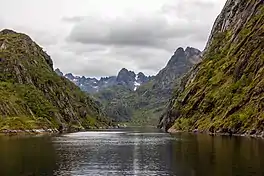 View of the fjord | |
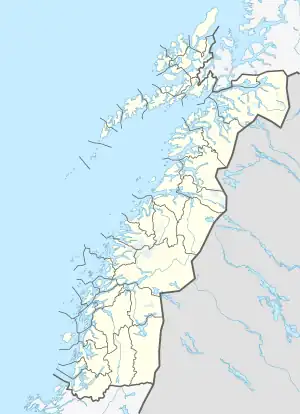 Trollfjorden Location of the fjord 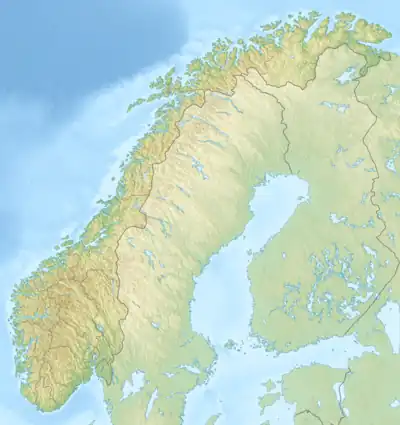 Trollfjorden Trollfjorden (Norway) | |
| Location | Nordland county, Norway |
| Coordinates | 68.3628°N 14.9361°E |
| Type | Fjord |
| Basin countries | Norway |
| Max. length | 2 kilometres (1.2 mi) |
| Max. width | 600 to 1,100 m (2,000 to 3,600 ft) |
| Max. depth | 72 metres (236 ft) |
The fjord is a popular tourist attraction due to the beauty of its natural setting. It is only accessible by boat or by a nearby 10 kilometres (6.2 mi) hike over very rugged terrain. The Hurtigruten's ships on the route between Bergen and Kirkenes detour into Trollfjorden. It is also popular with other cruise lines.
Geography
The mouth of the Trollfjord where it joins the Raftsundet is only 100 metres (330 ft) wide. The fjord widens to a maximum width of 800 metres (2,600 ft). The mountains surrounding Trollfjord are between 600 and 1,100 metres (2,000 and 3,600 ft) high. It is surrounded by the 1,084-metre (3,556 ft) tall mountain Trolltindan to the south and the 998-metre (3,274 ft) tall mountain Blåfjell and the 980-metre (3,220 ft) tall mountain Litlkorsnestinden to the north. The Trollfjord reaches a maximum depth of 72 metres (236 ft) below sea level.[1]
Prior to 1960, there was a waterfall at the end of Trollfjorden, but it was redirected to produce hydroelectricity at a nearby power station.
Controversy
The location of the fjord is a bit of a local controversy. In 2016, the movie Downsizing was filmed in the Trollfjord and it was advertised and discussed in the media as having been filmed in Lofoten, a traditional region of Norway. This, however, upset some in the neighboring traditional region of Vesterålen who claim the fjord as part of their region as well. Both sides claim to be right. The fjord is located on Austvågøya island (which is often considered part of Lofoten), but it is also in Hadsel Municipality (which is often considered part of Vesterålen).[2]
History
The Battle of Trollfjord
The Battle of Trollfjord (Norwegian: Trollfjordslaget) was fought in 1890 between the first industrial, steam-driven fishing ships and teams of traditional open-boat fishermen over access to the fjord. Johan Bojer described the battle in his 1921 novel The last of the Vikings (Den siste Viking).
A painting by Gunnar Berg, Trollfjordslaget depicts The Battle at Trollfjord. The painting is currently located in the Art Galleri Gunnar Berg on the island Svinøya in Svolvær town.[3]
Sailing into the Mousehole
In 1969 the TS Avalon,[4] a British Rail ferry/cruise ship, sailed into the Trollfjord, nicknamed the Mousehole by Capt William Bramhill, the ship's master. It then turned 180 degrees and came out. The captain said the experience meant he "nearly gave birth to kittens".[5] On his 1971 cruise Bramhill was relieved not to have to repeat the feat – all vessels were barred because of the danger of falling snow, ice and rocks. The Norwegian pilot, the same man as in 1969, remarked that the Avalon had the distinction of being the largest vessel to enter the fjord.
Avalon was 6,584GRT and 113m long; she carried 750 passengers in her role as a ferry but fewer on cruises. It is likely that the "largest ship" record is now held by the MS Otto Sverdrup [6] (formerly MS Finnmarken) which is 15,690GRT and 138.5m long.
Media gallery
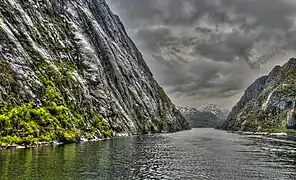 View of the fjord
View of the fjord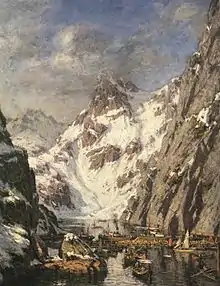 Trollfjordslaget (The Battle at Trollfjord) by Gunnar Berg
Trollfjordslaget (The Battle at Trollfjord) by Gunnar Berg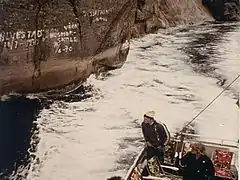 Trollfjord near Raftsund
Trollfjord near Raftsund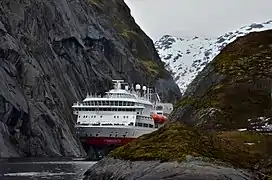 Hurtigruten entering the fjord
Hurtigruten entering the fjord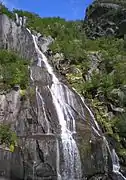 Waterfall on the sides of the fjord
Waterfall on the sides of the fjord
References
- "Trollfjord – the spectacular Arctic fjord". Fjord Travel Norway. Retrieved 2018-12-23.
- Ødegård, Johannes; Dalen, Ole; Lysvold, Susanne (2016-08-03). "Hollywood-innspilling har utløst bitter kommunekrangel". NRK Nordland (in Norwegian). Retrieved 2018-12-23.
- Frommer's Scandinavia article on Trollfjord
- "TS Avalon – Past and Present". 19 January 2013.
- "Google Docs: Sign-in".
- {https://www.hurtigruten.com/en-us/expeditions/ships/otto-sverdrup/}